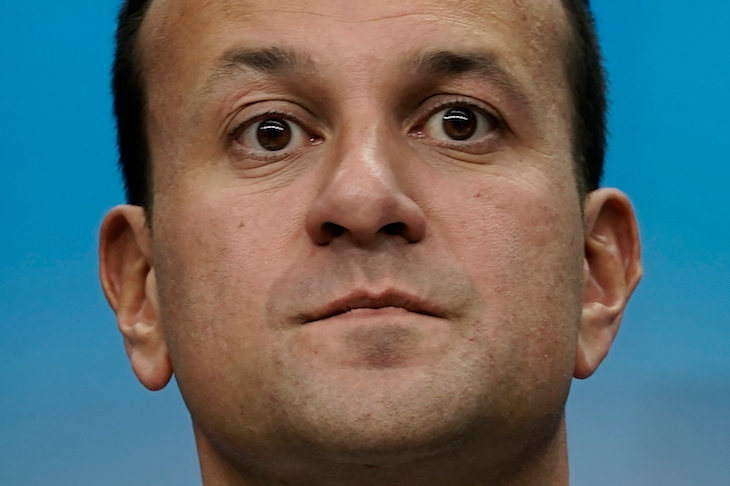There has been a revolt in Ireland. Not a huge one. It isn’t a Brexit-sized rebellion. It isn’t an all-out populist protest against the establishment of the kind we have seen in the US and various European countries in recent years. But still, the result of Saturday’s general election is a brilliant blow against the Irish establishment and its obsessively pro-EU, anti-Brexit leanings.
People are talking up the election result as a humiliation for Taoiseach and Fine Gael leader, Leo Varadkar. It certainly is that. Varadkar’s attempt to make the election about Brexit — and about his apparently brave efforts to frustrate Brexit — fell spectacularly flat.
But Varadkar isn’t the only one who failed to make Brexitphobia the organising principle of Irish political life. Vast swathes of the Dublin elite were likewise obsessed with Brexit. And now all of them have been exposed as being utterly out of touch with ordinary Irish people.
The results are striking. Both Fine Gael and Fianna Fail, the parties that sprung from the Irish Civil War of the 1920s and which dominated Irish politics for decades, are in serious decline. Between them, these parties once commanded more than 80 per cent of the Irish vote. In Saturday’s election, they got around 43 per cent of the vote. Ireland is emerging from the shadow of the Civil War and that’s no bad thing.
But it wasn’t only Varadkar who constantly and madly banged the Brexit-loathing drum. Dinner-party circles in Dublin talked about little else.
Fine Gael’s failures are particularly striking given that Varadkar had become a globally talked-about, much-cheered national leader over the past couple of years. In the 2011 general election, Fine Gael (led by Enda Kenny) won 76 seats in the Dail. In the 2016 election (still led by Kenny) it got 50 seats. This time around, led by the Brussels-feted figure of Leo Varadkar, it got 35 seats. Oh dear.
Understandably, many people are focusing on the Sinn Fein surge. Sinn Fein won 37 seats in the Dail, coming a very close second to Fianna Fail. That a party like Sinn Fein should push Fine Gael into third place is indeed extraordinary.
But the question is why Sinn Fein was able to do this. Both the right-wingers who are fretting that the vote for Sinn Fein represents a return to hardcore republicanism and the leftists excitedly talking up Sinn Fein as a radical voice in 21st century Ireland are missing the key dynamic here. Sinn Fein did well because, unlike the technocratic, globally-inclined Dublin elites, it focused mostly on national and local issues, on things people are actually concerned about. Housing, health, jobs.
Fine Gael’s catastrophic failure in this election is a searing indictment of the Varadkar approach to politics. Over the past couple of years, Varadkar allowed himself to become a patsy of the EU. He turned Ireland into little more than a battering ram against Brexit. With no sense of shame, he reduced himself to a pliant tool of the EU establishment, continually doing its bidding against Brexit by obsessing over (and exaggerating) the impact Brexit would have on the border in Ireland and on economic life in Ireland.
For this, he was celebrated in Brussels and Paris. He was cheered by European technocrats. He became a hero of Remainers in the UK. He was applauded by establishment lackeys at the Irish Times. And he got so carried away with being fawned over by foreign bureaucrats and pro-EU luvvies that he forgot about, or simply ignored, his own people and the issues they consider to be important.
Sure, he got pats on the back from powerful people in Paris and Berlin, but what about working people in Galway or Cork? Well, now we know what they think of Varadkar’s creepy love-ins with Eurocrats and his obsessive focus on the evils of Brexit — not much.
Here is the most staggering statistic from the Irish election: just one per cent of voters said Brexit was a deciding factor in how they voted. According to an exit poll by Ipsos/MRBI, voters were far more driven by concerns about healthcare (32 per cent), housing (26 per cent), and pension issues (eight per cent).
So there was the Taoiseach making speeches and writing articles for newspapers across Europe about the scourge of Brexit, while the people of Ireland were thinking about more pressing national issues. You couldn’t ask for a better snapshot of the chasm-sized moral and political divide that now separates the technocratic establishment from everyday voters.
But it wasn’t only Varadkar who constantly and madly banged the Brexit-loathing drum. Dinner-party circles in Dublin talked about little else. From Fintan O’Toole’s anti-Brexit ramblings to every political talk show on RTE, Ireland’s great and good droned on endlessly about the horribleness of Brexit and the wonderfulness of the EU.
Every time I’ve been on the Irish media over the past year I’ve been up against three or four people insisting Brexit is the worst disaster to befall Ireland since colonisation. It was nuts. And we now know that ordinary Irish people did not share this feverish loathing of Britain’s exit from the EU. The blinkered, elitist and often quite sneering worldview of virtually the entire Dublin chattering class has been wonderfully exposed by this election.
Varadkar made himself a globetrotting spokesman for Brexitphobia, and the Irish people just weren’t interested. There’s a lesson in this for political elites across Europe: quit your anti-democratic sucking-up to Brussels and listen to your own people for a change.







Comments